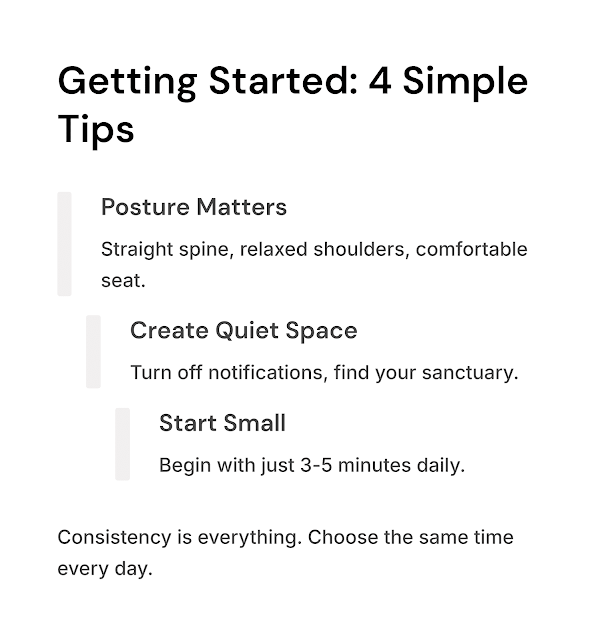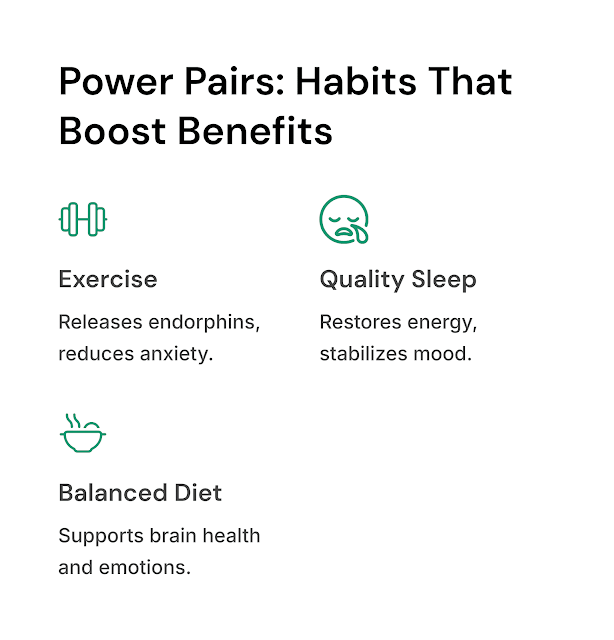"Ugh... I'm losing it."
Sound familiar? In today’s world, stress isn’t an occasional guest—it’s a full-time roommate. Work, relationships, finances... they all pile up, leaving us mentally exhausted and emotionally drained. But what if I told you there’s a surprisingly simple way to deal with it? And no, it’s not some new supplement or therapy trend—it’s meditation.
Meditation is no longer reserved for monks or yogis. In fact, studies and real-life experiences show that even just a few minutes of daily meditation can dramatically reduce stress, calm your mind, and help you regain focus. In this blog, we’ll dive into what meditation really is, how it works against stress, and why it could be your most powerful mental health tool.
What Is Meditation?
Meditation often brings to mind images of silence, crossed legs, and incense smoke—but it's much more than that. At its core, meditation is the practice of focusing your mind and being fully present in the moment. It’s not about stopping thoughts; it’s about observing them without judgment and gently returning your focus to the present.
When I first started meditating, I couldn’t sit still for five minutes without checking my phone. But over time, I noticed something shift—my racing thoughts slowed, and I didn’t get as easily triggered by small annoyances. Meditation helped me step back and breathe before reacting, and that alone changed how I experienced stress.
The Relationship Between Stress and Meditation
Stress triggers our fight-or-flight response, releasing hormones like cortisol and adrenaline. While this response is helpful in short bursts, chronic stress keeps the system activated, leading to anxiety, insomnia, and even depression. Meditation counteracts this by activating the parasympathetic nervous system—your body’s built-in “rest and digest” mode.
| Stress Reaction | Meditation Effect |
|---|---|
| Increased heart rate | Slows and stabilizes heart rate |
| Difficulty sleeping | Improves sleep quality |
| High cortisol levels | Reduces cortisol production |
A 2014 Harvard study showed that 8 weeks of mindfulness meditation led to measurable changes in brain gray matter, particularly in areas related to emotion regulation and stress response. Science is literally showing us what meditators have known for centuries—it works.
Types of Meditation
There’s no one-size-fits-all when it comes to meditation. Some prefer quiet stillness, others like guided audio or even movement. Here are a few common types:
- Breathing Meditation: Focus solely on the rhythm of your breath. Inhale, exhale—simple but powerful.
- Body Scan: Gently move your attention from head to toe, relaxing each part of the body as you go.
- Mindfulness Meditation: Observe your thoughts and emotions without trying to change or judge them.
- Visualization Meditation: Picture a peaceful scene—like a beach or forest—and immerse yourself in that mental escape.
I personally love visualization on rainy nights—it’s like teleporting to a calmer world. Experiment and see what clicks for you.
How to Meditate Effectively
Meditation isn’t about “doing it right.” It’s about showing up, consistently. But there are a few tips that can really help you get the most out of it—especially in the beginning when your brain just won't shut up. I’ve been there too, sitting cross-legged, annoyed that I couldn’t stop thinking about dinner.
First, posture matters. You don’t have to sit like a monk. A straight spine, relaxed shoulders, and comfortable seat (chair is fine!) will do wonders. Don’t strain—just sit as naturally as you can while staying alert.
Second, create a quiet space. Turn off notifications. Close the door. If your environment is noisy, use noise-canceling headphones or ambient music. When I first started, I’d even meditate in my car before work—anything to get a moment of silence.
Third—and this is big—start small. Don’t expect yourself to sit for 30 minutes on day one. Begin with just 3–5 minutes. Let it be easy. Let it feel short. As you build consistency, you’ll naturally crave more time on the cushion.
Finally, consistency is everything. Choose the same time every day—maybe right after waking up or before bed. It’ll become a ritual, like brushing your teeth. And trust me, your mind will thank you for it.
Habits That Amplify the Power of Meditation
Meditation is powerful on its own, but when paired with other healthy habits? Game-changer. Think of it like building an inner ecosystem—everything supports everything else. Here’s a quick breakdown of supportive lifestyle habits:
| Habit | Why It Helps |
|---|---|
| Regular Exercise | Releases endorphins, reduces anxiety, boosts focus |
| Quality Sleep | Restores energy, supports mental clarity, stabilizes mood |
| Balanced Diet | Supports brain health and emotional regulation |
| Creative Hobbies | Relieves stress, boosts joy and personal growth |
You don’t need to master everything at once. Just pick one habit to stack with your meditation. Start small, stay steady.
Research-Backed Benefits of Meditation
Meditation isn’t just a feel-good trend—it’s backed by hard science. Let’s run through some major studies and their findings:
- A 2014 Harvard study found increased gray matter density in areas responsible for stress regulation after just 8 weeks of mindfulness meditation.
- UC Davis researchers showed that daily meditation improves attention span and emotional resilience over time.
- Studies from the Journal of Clinical Psychology link regular meditation with lower levels of depression and anxiety.
- One randomized trial noted decreased cortisol levels and blood pressure in individuals practicing meditation versus control groups.
We’re talking about actual, visible changes to your brain and body. It’s not magic—it’s mindfulness.
Frequently Asked Questions (FAQ)
Start small—just sit comfortably, close your eyes, and focus on your breath for 3–5 minutes. That’s it. You can always extend later.
Try a guided app like Headspace or Insight Timer to help you ease into it with gentle instructions.
That’s totally normal. It’s not a problem—it’s practice. Notice the thought, then come back to your breath.
Meditation is like going to the gym—every time you bring your attention back, you're training your focus muscle.
Early morning or before bed are popular, but the best time is whenever you can be consistent. Even your lunch break can work.
The more consistently you do it, the more benefit you’ll feel—regardless of the time.
Yes! Popular options include Calm, Headspace, Insight Timer, and Balance. Each has free versions too.
They offer guided sessions, timers, soothing music, and even breathing exercises to get you going.
Some people feel calmer after just one session, but it usually takes 2–3 weeks of consistency to notice major changes.
Stick with it, and you'll not only feel better—you’ll start seeing the world differently too.
In a world that rarely slows down, meditation is not a luxury—it’s a lifeline. Whether you're drowning in deadlines, struggling with anxiety, or just craving peace, meditation offers a space to breathe. If you’ve read this far, maybe it’s your sign. So go ahead—take a deep breath, close your eyes, and reclaim your calm. Your mind deserves this moment.
Related Resources
- Meditation and Mental Health – NCBI Study
- Headspace – Meditation App
- Calm – Sleep & Meditation Support
- YouTube: 10-Minute Guided Meditation for Stress

![[MentalHelp, Mental Health Stress]Why Meditation Is the Real Antidote to Stress [MentalHelp, Mental Health Stress]Why Meditation Is the Real Antidote to Stress](https://blogger.googleusercontent.com/img/b/R29vZ2xl/AVvXsEg1gEZEkbfjdfc3pi83hebGVWqU5xa5rgBtpagtzto2PyJyYbYWzWoqErHYeXrlpTFSZ-86NoEmL6Rg0iBRbPeQ5QYMRau9FZSpGXE1ZPOnH7vuw6lyuQAlFTsjOcggACNMneCMc8e9DObv0jjdIz34dEVyFDHHKy6GAjfZONXYlmIYFZPBZtGZ8j9usDQ/w640-h640-rw/1_Stressed-Out.png)






Post a Comment